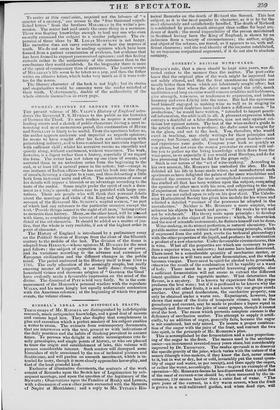HUGHES'S HISTORY OF GEORGE THE THIRD.
THE present volume of Mr. VALPY'S History of Englund intro- duces the Reverend T. S. Huones to the public as the historian of GEORGE the Third. To such readers as require a resume of leading events and a sketch of public characters during a most in- teresting and most momentous period, this continuation of Hume and SNIOLLLTT is likely to be useful. From the specimen before us, the author appears moderate and impartial as regards opinions; he seems to have sought after his facts and information with painstaking industry, and to have combined his materials together with sufficient skill ; whilst his narrative carries us smoothly and quietly along, without excitement, without weariness. The work, however, is a digest rather than a history, especially if we regard the form. The writer has not taken up one class of events, and narrated them in an unbroken series from the beginning to the end, or at least till a natural pause in the action; but—except in one instance of Indian althirs—he has cast his book into the shape of annals, devoting a chapter to a year, and thus detracting a little both from historical unity and effect. The minuteness of some of his details will appear a blemish or an advantage according to the taste of the reader. Some might prefer the spirit of such a docu- ment as a king's speech; others may be gratified with large quo- tations. There are people who will think that personal details about the marriage and visits of the King and Queen, with the account of the Reverend Mr. SCHUTZ'S nuptial sermon, "no part of which had any reference to the particular occasion except the text,' Provide things honest in the sight of all men,' " belong rather to memoirs than history. Many, on the other hand, will be pleased with them, as combining the interest of anecdote with the minute detail of the old chronicle. It should be added as a matter of jus- tice, that the whole is very readable, if not of the highest order in point of character.
The History of England is introduced by a preliminary essay on the Political System of Europe from the close of the fifteenth century to the middle of the last. The division of the times is adopted from HEEREN,—whose opinions M. HUGHES for the most part follows : the subject of exposition is the balance of power, and its variations according to the advance and extension of European civilization and the different changes in the public mind. The period embraced in the History itself is from 1760 to 1766. The early education of the seemingly simple, but really cunning master of kingcraft, is not badly done; though the household virtues and decorous religion of " GEORGE the Good" have evidently made a favourable impression on the mind of the divine. The dismissal of PITT is told very fairly. So is the com- mencement of the Monarch's personal warfare with the reprobate Wines, and his more kingly but equally unfortunate contention with the American colonies ; at the beginning of which two great events, the volume closes.


























 Previous page
Previous page